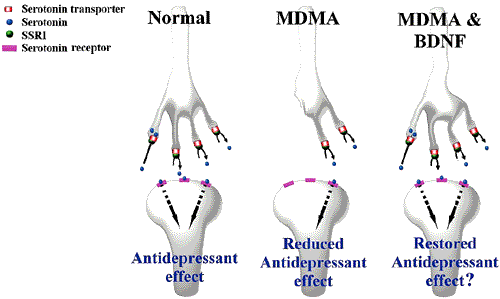| 2004 |

|
YEAR BOOK |
University College Cork & Trinity College Dublin
|
Abuse of 'Ecstasy': a predisposing factor to depression?
|
Methylenedioxymethamphetamine (MDMA; 'Ecstasy') is a recreational drug and, according to a recent United Nations Global Drug Survey, Ireland is amongst those European countries showing an increased prevalence of MDMA abuse. Whilst the incidence of acute toxicity and fatalities associated with MDMA consumption is relatively low, long-term neurotoxicity is a major cause of concern. Specifically, a vast literature indicates that MDMA produces serotonergic nerve terminal loss in the central nervous system (CNS) of both laboratory animals, and humans. Serotonergic neurodegeneration induced by MDMA is problematic, considering that psychiatric disorders such as depression and panic disorder are associated with low serotonin. In addition, a number of case reports indicate that users of drugs that elicit serotonergic neurotoxicity, such as MDMA, have presented with psychiatric symptoms including depression and panic attacks.

Current research is focused on examining the possibility that antidepressant responses can be reinstated, following spontaneous regeneration of serotonin nerve terminals that occurs slowly over time. In addition, it is suggested that strategies that promote regeneration of serotonin nerve terminals will accelerate and enhance recovery of antidepressant action following exposure to MDMA. For instance, exogenous administration of brain-derived neurotrophic factor (BDNF), or strategies that enhance endogenous BDNF expression, are being examined with a view to promoting serotonin nerve terminal regeneration, and reinstatement of antidepressant responsiveness. These studies will enhance our understanding of the ability of the brain to recover from MDMA induced serotonergic neurotoxicity.
Contact: Dr Andrew Harkin, Department of Pharmacology & Therapeutics, School of Pharmacy, University College Cork;
E-mail: [email protected]